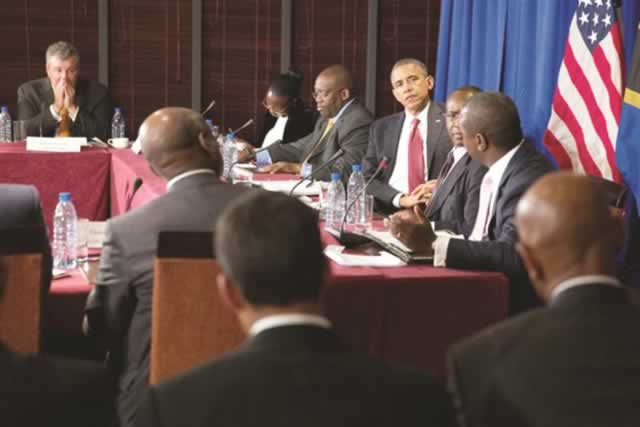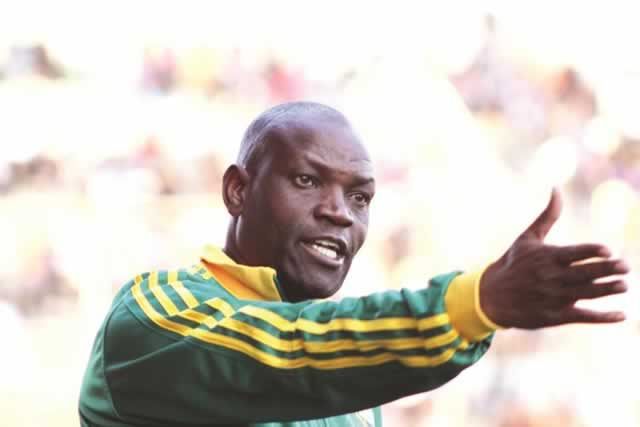Time Africa took a stand

Joram Nyathi
THE US-Africa Summit in Washington, DC, has come and gone. President Mugabe was not invited, and he didn’t go. As fate would have it, he didn’t have to be there in person. He had already made his point at his party’s and his own victory celebration in last year’s elections where he rapped Western nations for their hypocrisy about human rights after they remained silent for two weeks about the slaughter of women and children in Gaza.
Instead, at this week’s US-Africa Business Forum, a young Zimbabwean technology entrepreneur stepped into President Mugabe’s shoes to expose President Obama’s web of lies and duplicity about “targeted sanctions” and the US’s purported concern for the people of Zimbabwe.
But first, the impetus for the summit: Well, a truth we have repeated in these columns is finally being openly acknowledged in the US: that the United States is desperate to increase its influence and access to African resources. US media were this week awash with America’s “catch-up” theatrics to counter what they disingenuously termed “Chinese neocolonialism” as if American designs were any more philanthropic, not to mention the toxic miasma of its propaganda!
What is not clear though is why African leaders felt in their collectivity that it was in the continent’s best interest to travel to America for purposes of aiding this catch-up project.
Prophet Sankara
On July 29, 1987, a young president of an African country addressed fellow leaders at the Organisation of African Unity headquarters in Addis Ababa, Ethiopia. He said successive OAU meetings were turning out to be the same, and that fewer leaders were attending even after they were duly invited “to come discuss Africa, in Africa”.
Then he posed a rhetorical question: “How many heads of state are ready to dash off to Paris, London, or Washington when called to meetings there, but are unable to attend a meeting here in Addis Ababa, in Africa?”
That leader was discussing the issue of African debt and proposing that the continent should take a common position and refuse to pay. He said the debt burden was a new form of slavery, and even quipped that if we refuse to pay the debt, those who gambled with their loans will not die, yet many lives will be lost in Africa as resources were mobilized towards debt repayment.
The speaker was Thomas Sankara of Burkina Faso. There were 16 heads of state at that conference out of 50 members of the OAU then. Twenty-seven years later, the African mentality has not changed. The seduction of Europe and America has only grown stronger, more deadly in its allure like the chant of a siren. A whisper is enough to get duly elected African leaders dashing off to London, Tokyo, Washington, Lisbon and Paris for summits to be told by their former colonisers what is good for their countries.
So it is that there were 50 African heads of state this week who dashed off to America to meet President Obama. There they were told of the need for good governance, food security, democracy, the sanctity of human and property rights, and then of course, security. They were told of a huge market for their products in America.
Then they were told that American companies were ready to invest in Africa to create jobs. And there is a lot of “catch-up” to do.
China is already invested in Africa to the tune of about $246 billion. America is a measly $85 billion. Given the conflagration America has ignited in the Middle East, there is no doubt that the US will increasingly rely on its Africom as a spear head in its foray into the heart of Africa in search of fuel sources in South Sudan, Nigeria and Angola, and other resources in Central Africa.
But the rude question must be asked: Why does a whole continent have to be summoned for a summit by a little country in Europe simply because it enjoys the dubious status of being a former colonial power? Shall Africa ever wean itself of this servility to Europe and give substance to the fact of our political independence?
African solutions
What Sankara was proposing was not rocket science. It was a basic adage, charity begins at home, what Thabo Mbeki was to later elaborate on as African solutions to African problems. But we don’t seem to be ready for the African renaissance yet. Africa still craves Western tutelage, hence the summits.
African leaders are failing their people. There is no doubt that the continent would be far better off with dreamers like Kwame Nkrumah, Thomas Sankara, Steve Biko, Patrice Lumumba and many other revolutionaries who dreamt of a strong, united Africa.
Africa needs to change the rules of engagement. We cannot continue to follow the same prescriptions for development offered by the West when they have failed for the past nearly 60 years. Africa must speak with one voice, engage the world on its own terms. It has the resources which the world needs, it cannot be ignored. All it needs is to set new terms of trade.
For more than half a century Africa has been giving other nations its raw materials while it buys back expensive processed goods. It has never been able to influence prices on the international market because it neither produces nor beneficiates what is produced, which is in fact produced by foreign companies from Europe which then cart them away to feed their factories to keep their youth employed. Africa for its part is exporting raw materials and potential jobs.
That routine must change. No number of summits will propel Africa towards development so long as the agenda for those summits are set by foreigners. In fact, the more summits Africans attend in their variegated ideological disparities, the further away the continent drifts from political and economic integration.
It is not far-fetched to assert that most of these summits, all of them held in the glamour of Europe and America, are deliberately meant to take our eyes off the material reality of our daily existence. It is like Jesus being taken to the summit of the mountain and being told by the Devil to observe the glamorous city below. “All that I shall give it to you if you kneel down and worship me.”
Imagine you were Jesus. Would you resist the temptation?
The glamour we so admire in Europe and America did not become, there were sacrifices made, including the sweat and blood of slaves. Africans must first learn to trade with each other before they can match the technologies of Europe. Soon the population of the continent shall hit 1 billion people. That’s a huge market if we can get our industries to produce and curb our people’s addiction for foreign products.
Chingonzo, 21
Obama did not need Mugabe to be reminded that there is a country called Zimbabwe. Nust student Takura Chingonzo, co-founder of Saisai Wireless, told Obama that sanctions were affecting his business and those of other youths.
This is a 21-year youth who has nothing to do with politics but a rising internet entrepreneur. But when it came to trying to import some technology from American companies for his business, each time he was told point blank, “unfortunately we cannot do business with you because you are from Zimbabwe. And I was shocked, this doesn’t make sense,” Chingonzo told Obama.
He reminded Obama that the sanctions were supposed to be targeted! To which Obama took refuge in the politics of obfuscation — violation of basic democratic practices and human rights, etc.
“It may be that you and a group of entrepreneurs in Zimbabwe are able to meet with us and propose certain projects that allow us to say this is something that will advance as opposed to retard the progress for the people of Zimbabwe,” responded Obama. But this doesn’t make sense Mr President. Why should America decide which types of business Zimbabweans should engage in?
This debunks the naïve myth that you can divorce business from politics. These are the basic truths which Africa must accept and be prepared to carry their own cross.












Comments